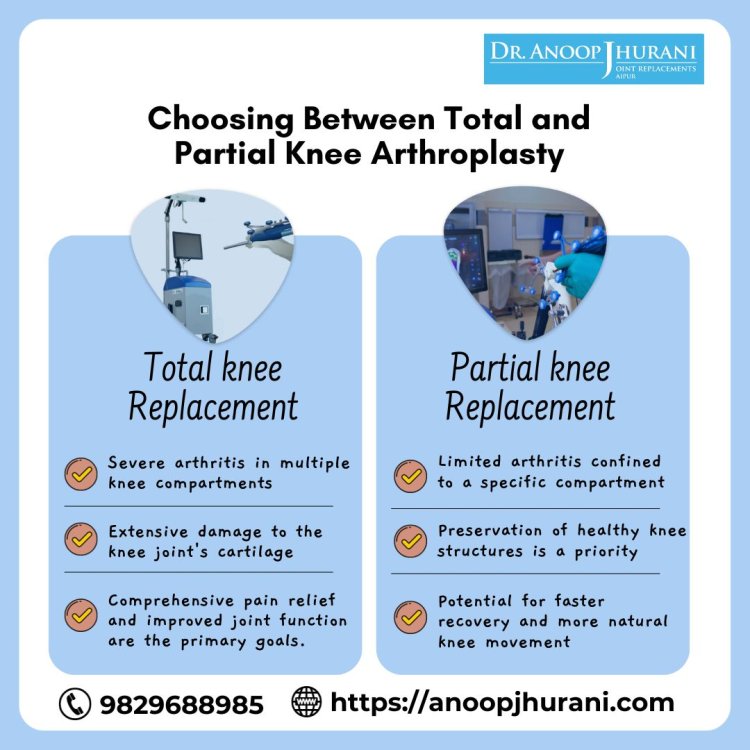Choosing Between Total and Partial Knee Arthroplasty
Dr. Anoop Jhurani offers orthopedic services such as knee and hip replacements. He is a renowned orthopedic surgeon in Jaipur, India.
Share this Post to earn Money ( Upto ₹100 per 1000 Views )

Knee replacement surgery, or knee arthroplasty, has become a beacon of hope for individuals grappling with severe knee pain and reduced mobility due to conditions like osteoarthritis. In India, where medical advancements are rapidly evolving, patients now have the option to undergo either total or partial knee replacement surgery based on the extent of damage to their knee joint.
Understanding the Need for Knee Replacement: Before delving into the types of knee replacement, it's crucial to recognize the reasons why someone might require this surgical intervention. Osteoarthritis, a degenerative joint disease, is a common culprit, leading to the deterioration of the knee joint's cartilage and causing pain, swelling, and limited range of motion.
1. Total Knee Replacement (TKR): Indications: When osteoarthritis affects multiple knee compartments, leading to widespread damage.
Procedure: In a TKR, the entire knee joint is replaced with prosthetic components, including metal and plastic implants.
Benefits: Comprehensive relief from pain and improved joint function.
2. Partial Knee Replacement (PKR): Indications: When osteoarthritis is confined to a specific compartment of the knee joint.
Procedure: In a PKR, only the damaged portion of the knee, such as the medial, lateral, or patellofemoral compartment, is replaced with metal and plastic implants.
Benefits: Preserves healthy parts of the knee, faster recovery, and potentially more natural movement.
Choosing Between Total and Partial Knee Replacement:
The decision between total and partial knee replacement depends on the extent and location of the arthritis. If the damage is isolated to a specific compartment, a partial knee replacement may be more suitable. However, if arthritis is widespread, affecting multiple compartments, a total knee replacement may be the preferred option for comprehensive relief.
Considerations for Total Knee Replacement:
· Severe arthritis in multiple knee compartments.
· Extensive damage to the knee joint's cartilage.
· Comprehensive pain relief and improved joint function are the primary goals.
Considerations for Partial Knee Replacement:
· Limited arthritis is confined to a specific compartment.
· Preservation of healthy knee structures is a priority.
· Potential for faster recovery and more natural knee movement.
Conclusion:
Knee replacement surgery, whether total or partial, has transformed the lives of countless individuals suffering from debilitating knee conditions. In India, the availability of advanced surgical techniques allows for a personalized approach to address the unique needs of each patient. Consulting with a skilled orthopedic surgeon is essential for a thorough assessment and informed decision-making, ensuring the best possible outcome for knee replacement surgery.
















